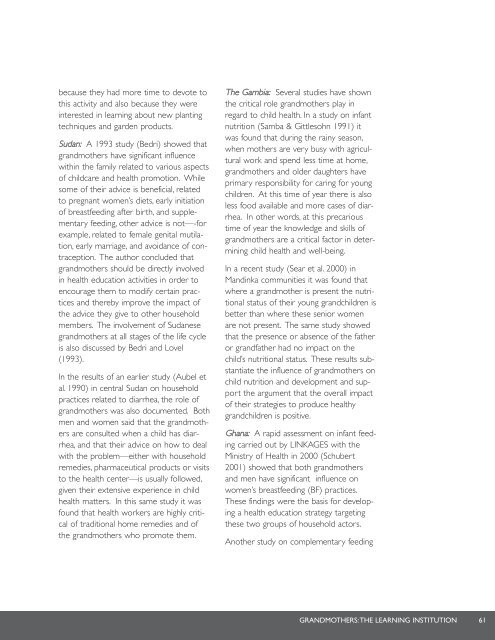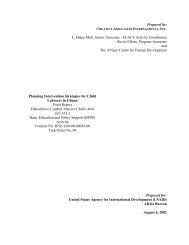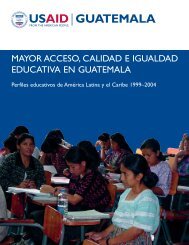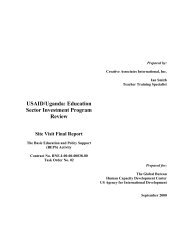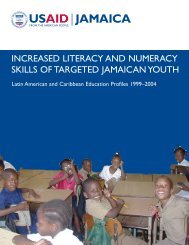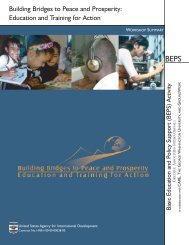Grandmothers: A Learning Institution - Basic Education and Policy ...
Grandmothers: A Learning Institution - Basic Education and Policy ...
Grandmothers: A Learning Institution - Basic Education and Policy ...
- No tags were found...
You also want an ePaper? Increase the reach of your titles
YUMPU automatically turns print PDFs into web optimized ePapers that Google loves.
ecause they had more time to devote tothis activity <strong>and</strong> also because they wereinterested in learning about new plantingtechniques <strong>and</strong> garden products.Sudan: A 1993 study (Bedri) showed thatgr<strong>and</strong>mothers have significant influencewithin the family related to various aspectsof childcare <strong>and</strong> health promotion. Whilesome of their advice is beneficial, relatedto pregnant women’s diets, early initiationof breastfeeding after birth, <strong>and</strong> supplementaryfeeding, other advice is not—-forexample, related to female genital mutilation,early marriage, <strong>and</strong> avoidance of contraception.The author concluded thatgr<strong>and</strong>mothers should be directly involvedin health education activities in order toencourage them to modify certain practices<strong>and</strong> thereby improve the impact ofthe advice they give to other householdmembers. The involvement of Sudanesegr<strong>and</strong>mothers at all stages of the life cycleis also discussed by Bedri <strong>and</strong> Lovel(1993).In the results of an earlier study (Aubel etal. 1990) in central Sudan on householdpractices related to diarrhea, the role ofgr<strong>and</strong>mothers was also documented. Bothmen <strong>and</strong> women said that the gr<strong>and</strong>mothersare consulted when a child has diarrhea,<strong>and</strong> that their advice on how to dealwith the problem—either with householdremedies, pharmaceutical products or visitsto the health center—is usually followed,given their extensive experience in childhealth matters. In this same study it wasfound that health workers are highly criticalof traditional home remedies <strong>and</strong> ofthe gr<strong>and</strong>mothers who promote them.The Gambia: Several studies have shownthe critical role gr<strong>and</strong>mothers play inregard to child health. In a study on infantnutrition (Samba & Gittlesohn 1991) itwas found that during the rainy season,when mothers are very busy with agriculturalwork <strong>and</strong> spend less time at home,gr<strong>and</strong>mothers <strong>and</strong> older daughters haveprimary responsibility for caring for youngchildren. At this time of year there is alsoless food available <strong>and</strong> more cases of diarrhea.In other words, at this precarioustime of year the knowledge <strong>and</strong> skills ofgr<strong>and</strong>mothers are a critical factor in determiningchild health <strong>and</strong> well-being.In a recent study (Sear et al. 2000) inM<strong>and</strong>inka communities it was found thatwhere a gr<strong>and</strong>mother is present the nutritionalstatus of their young gr<strong>and</strong>children isbetter than where these senior womenare not present. The same study showedthat the presence or absence of the fatheror gr<strong>and</strong>father had no impact on thechild’s nutritional status. These results substantiatethe influence of gr<strong>and</strong>mothers onchild nutrition <strong>and</strong> development <strong>and</strong> supportthe argument that the overall impactof their strategies to produce healthygr<strong>and</strong>children is positive.Ghana: A rapid assessment on infant feedingcarried out by LINKAGES with theMinistry of Health in 2000 (Schubert2001) showed that both gr<strong>and</strong>mothers<strong>and</strong> men have significant influence onwomen’s breastfeeding (BF) practices.These findings were the basis for developinga health education strategy targetingthese two groups of household actors.Another study on complementary feedingGRANDMOTHERS:THE LEARNING INSTITUTION61


